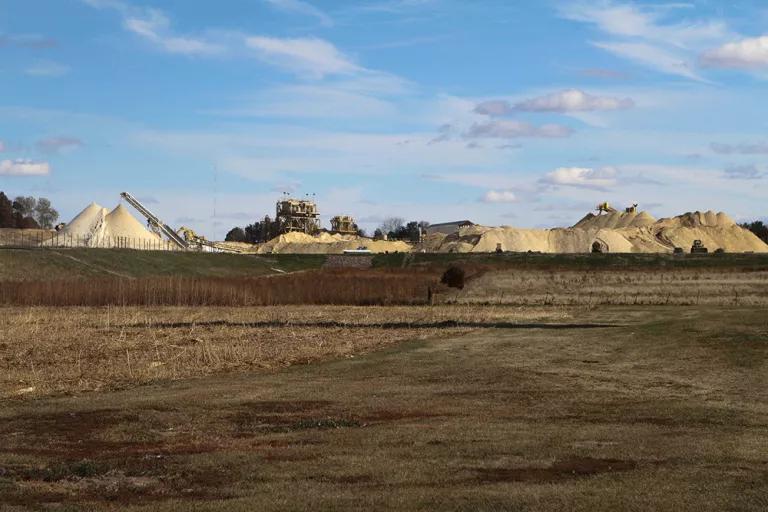Like Sands Through the Fracking Facility
The frac sand business is booming in Wisconsin. Too bad the state can’t get a handle on the industry’s water pollution.

Cattle farmer Ken Schmitt walked up to a creek near his Wisconsin farm last June. Instead of a crystal-clear brook, he saw what looked like coffee with cream. Effluent from a nearby mine, where a company harvests sand used in the fracking industry, had washed into the creek during a rainstorm.
All over western Wisconsin, silt, sand, and chemicals from frac sand mines have been spilling into waterways, damaging trout habitat. Wisconsin holds 75 percent of the market for frac sand, 95 billion pounds of which was injected into fracking wells last year. In the last decade, the number of frac sand mines in Wisconsin and Minnesota, the other hot spot for the industry, has doubled.

The Wisconsin Department of Natural Resources (DNR), the agency responsible for policing the growing industry, however, hasn’t been able to keep up with the sand boom. “They’ve written all these permits for all these mines, and they have no staff to oversee or inspect them on any regular basis,” Schmitt says.
Back in 2009, the agency reissued a permit for nonmetallic mining. It was not designed specifically for frac sand mining, however, and failed to address the chemicals used and the size and amount of dust that result. That permit expired last April, and though the DNR is planning to issue a new one this year, environmentalists aren’t expecting much improvement.
The new permit would likely require companies to do more monitoring (i.e. report how much silt and sand is ending up in waterways) but wouldn’t address the current lapses in the agency’s oversight.
In the meantime, the question is whether the agency can even continue to regulate mines under the expired permit. “Because DNR’s actions are beyond the scope of its authority under state law, we request the DNR immediately cease granting coverage to new dischargers,” wrote Jimmy Parra, a staff attorney at Midwest Environmental Activists, in a December letter to agency secretary Cathy Stepp.

But the DNR says it does have the authority to allow new mines under the expired permit. The new permit will be stricter, but the old one still covers the mines now, says Deb Dix, an environmental enforcement specialist for the department.
Even if the DNR can legally issue new permits, should it? The agency doesn’t seem to be able to manage what’s on its plate currently. A report by the Land Stewardship Council recently found that more than 40 percent of the frac sand companies operating in Wisconsin have violated state regulations. The DNR approval is insufficient to protect waterways, and no other permits should be granted without more protections, says Parra. “The old permit is a bad permit, and even the DNR has acknowledged that in the media,” he says.
In addition to silt, some facilities are discharging metals such as arsenic, cadmium, aluminum, lead, manganese, and copper, according to samples collected by the agency. Those metals, paired with low pH levels in the soil, create acidic water that can further damage ecosystems.
Right now there about 135 frac sand operations in Wisconsin, supplying an oil and natural gas industry that continues to grow. If the state doesn’t get a handle on the sand mining soon, cattle farmers like Schmitt are going to see a lot more coffee-colored creeks.
This article was originally published on onEarth, which is no longer in publication. onEarth was founded in 1979 as the Amicus Journal, an independent magazine of thought and opinion on the environment. All opinions expressed are those of the authors and do not necessarily reflect the policies or positions of NRDC. This article is available for online republication by news media outlets or nonprofits under these conditions: The writer(s) must be credited with a byline; you must note prominently that the article was originally published by NRDC.org and link to the original; the article cannot be edited (beyond simple things such grammar); you can’t resell the article in any form or grant republishing rights to other outlets; you can’t republish our material wholesale or automatically—you need to select articles individually; you can’t republish the photos or graphics on our site without specific permission; you should drop us a note to let us know when you’ve used one of our articles.

The Impact a Wisconsin LCD Plant May Have on the Great Lakes Is Not Crystal Clear
One of the Worst Places for a Pipeline? Under the Great Lakes
In Planning for Climate Change, Native Americans Draw on the Past